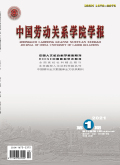中国劳动关系学院学报2024,Vol.38Issue(z1):97-103,7.
德国集体性劳动争议处理的框架及其启示
The Settlement Framework of Collective Labor Dispute of Germany and Its Lesson for China
摘要
Abstract
In Germany,collective labor disputes include two types of respective collective labor dispute,and dispute of collective labor law.The former should be solved through labor dispute litigation.The latter includes dispute of interest and dispute of right.The dispute of rights will be solved through litigation.In the disputes of interests,the dispute of factory agreement will be solved through mediation system with enforcement force;the dispute of collective agreement will be solved through voluntary mediation,if the actors are not willing to accept the result of mediation,they can initiate collective agreement.We can draw lessons from these guideline and methods.关键词
德国/集体劳动争议/利益争议/权利争议Key words
Germany/collective labor dispute/dispute of interest/dispute of right引用本文复制引用
沈建峰..德国集体性劳动争议处理的框架及其启示[J].中国劳动关系学院学报,2024,38(z1):97-103,7.基金项目
本文为中国劳动关系学院青年项目《用人单位劳动规章制度法律问题研究》的部分成果(项目编号:13YQ005). (项目编号:13YQ005)

